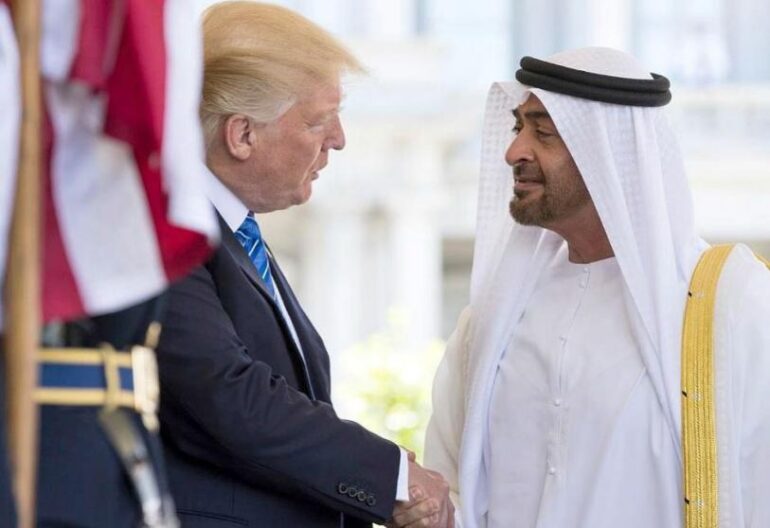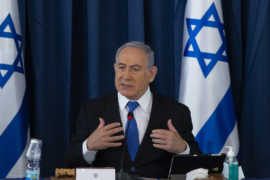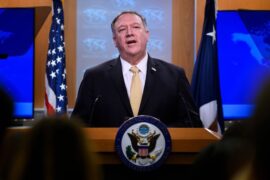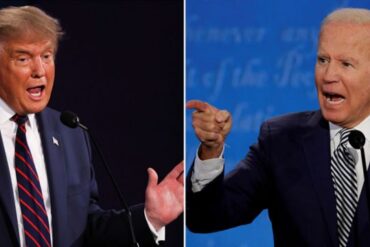Prime Minister Binyamin Netanyahu (Likud) has been dropping hints for weeks that United States President Donald Trump was preventing him from applying Israeli sovereignty to portions of the disputed Samaria and Judea regions.
The most overt public statement came in a Monday interview with Channel 20, in which the prime minister said that “it was clear from the start that the application of sovereignty would be done only with agreement from the United States.”
Referring to the coronavirus pandemic, racial justice protests across the US and an upcoming presidential election in November, Netanyahu argued that “Trump is now busy with other things, and this is not on the top of his mind.”
But on Thursday afternoon it became clear that Trump has actually been paying close attention to the Semitic region.
Although he forced Netanyahu to slam the breaks on annexing the 30% of the West Bank supposedly allowed for in Trump’s two-state “Deal of the Century” – a move that severely hurt the prime minister with his Likud party’s nationalist base – the US president has now thrown Netanyahu a political lifeline in the guise of an official peace agreement between Israel and the United Arab Emirates.
The official normalization of relations between Israel and the UAE is expected to lead to economic investment, direct flights between the countries, tourism, security cooperation and the establishment of reciprocal embassies.
Since failing to move sovereignty plans for the West Bank forward on July 1, the prime minister’s public approval ratings have been in free fall.
A poll commissioned by the Maariv newspaper earlier this week showed the Likud party plummeting to 27 (from its current 36) Knesset seats. Most of the respondent who had left the Likud seem to have gone over to Yamina, which rose to 18 (from its current 5) mandates in the poll, showing that much of the national camp has lost faith in Netanyahu.
Yamina chairman Naftali Bennett praised the UAE deal on Thursday but slammed the prime minister for shelving sovereignty plans.
“It’s tragic that Netanyahu didn’t seize the moment and didn’t have the courage to apply sovereignty to a centimeter of the land of Israel,” said Bennett. “But sovereignty over the parts of our homeland will come from somewhere else.”
Despite White House statements that the UAE deal will suspend Israeli moves to apply sovereignty to parts of the West Bank, Trump actually canceled Israel’s annexation plans months ago.
Netanyahu insisted Thursday night that he will advance annexation plans, in coordination with Washington, when the time is right. But the problem with accepting a framework in which Israel relies on an empire’s green light to secure its national interests is that said green light can always be withheld. In fact, the fundamental problem inherent in the entire conversation surrounding sovereignty since Trump revealed his “Deal of the Century” has been that it’s taken place within a framework of Washington granting us “permission” (how can an independent nation seriously speak about applying sovereignty to its heartland within the framework of a foreign power’s permission?).
The UAE deal – dubbed the “Abraham Accords” – was sealed late Thursday afternoon in a three-way phone conversation between Trump, Netanyahu and Sheikh Mohammed bin Zayed, crown prince of Abu Dhabi and president of the UAE.
The Abraham Accords, Israel’s first official peace treaty with an Arab state since the agreement with the Hashemite Kingdom of Jordan in 1994, was primarily negotiated by Trump’s son-in-law and adviser Jared Kushner, together with Secretary of State Mike Pompeo, Middle East Envoy Avi Berkowitz and National Security Advisor Robert O’Brien.
This “normalization” agreement between Israel and the UAE, touted as an historic breakthrough for Israel, was also a necessary diplomatic victory for the Trump administration as the US moves closer to elections. It successfully took the spotlight from Democratic party candidate Joe Biden’s selection of Kamala Harris as his running mate and gave Trump what appears to be an impressive diplomatic victory in an often volatile region.
Despite a statement from Jared Kushner on Thursday reiterating Trump’s commitment to the “two-state solution” and expressing hope that Israel’s agreement to suspend sovereignty plans will bring the Palestinian Authority to the negotiating table, it’s clear that Trump grew tired of attempting to broker an agreement between Israelis and Palestinians – a feat that proved far too challenging for his administration. But all the US president actually requires to meet his immediate political needs is a photo op with Netanyahu signing an agreement with any Arab leader. If PA President Mahmoud Abbas isn’t an option, Trump’s team was likely quick to draw up a short list of alternatives (despite warming ties with Israel in recent years, the Saudis probably aren’t yet prepared for such a step).
Accepting Trump’s spin that Israel’s annexation plans were suspended as a result of the UAE deal, many Israelis are viewing the situation as if Netanyahu traded sovereignty over parts of our homeland in exchange for the Abraham Accords. But such an understanding of events would be naive.
For all his faults and weaknesses, Netanyahu does have years of experience in office resisting the US and its designs for our region. He doesn’t frontally push back against empire as Prime Minister Yitzḥak Shamir did but he has often done a decent job outmaneuvering US presidents.
Bill Clinton became so frustrated that he actually sent a team of political operatives to successfully remove Netanyahu from office in 1999. Barack Obama attempted to do the same in 2015 with V-15 but failed. And there was at least one moment when Donald Trump lost his patience and considered the same play.
While the State of Israel should aspire to indigenize into the region and unify with our neighbors around the common interests of the Semitic peoples, Jerusalem should generally avoid forging alliances with neighboring states based on Washington’s regional agenda.
Israelis should also be tired of setting the bar so low for peace by celebrating yet another abnormal “normalization” deal. There’s nothing normal about Israel’s relationships with Egypt or Jordan, the two Arab nations Jerusalem signed formal peace agreements with 41 and 26 years ago, respectively.
Egypt received the Sinai peninsula and US military aid but there’s no actual relationship between the Israeli and Egyptian peoples. Jordan received access to water but there’s no relationship between the Israeli and Jordanian peoples.
Now the UAE will likely receive weapons and intelligence to fight against Iran but will there be any real relationship between Israelis and Emiratis?
Merely agreeing for our governments, ruling elites and military leaders to collaborate when it suits their mutual interests isn’t real peace, and collaborating within the framework of US interests won’t serve to indigenize Israel or Israelis into the Semitic region.
Whatever one thinks of the Abraham Accords (or any regional agreement brokered by the US), it would be naive to assume Netanyahu gave up on sovereignty in Judea and Samaria in exchange for the agreement. That’s not what happened. Trump had already cancelled sovereignty months ago. But a desperate Netanyahu saw a chance to hitch a ride on Trump’s political lifeboat and he took it.





